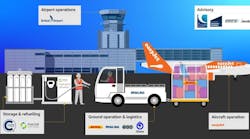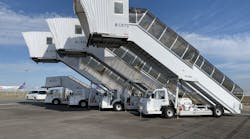March 04--In the near future, hundreds of millions, perhaps billions, of people in developing countries could gain access to the Internet through solar-powered drones created by a small company in Moriarty.
That's if the social media giant Facebook follows through on what's rumored to be a $60 million offer to buy Titan Aerospace, a small startup company that's been developing solar-powered drones at the Moriarty Municipal Airport since 2012.
The technology blog TechCrunch and the financial news outlet CNBC reported Tuesday that the talks were underway, based on sources that are said to have access to information about the deal.
Facebook reportedly wants to use Titan's unmanned aircraft -- which Titan says can stay aloft for up to five years -- to act as an inexpensive, low-flying satellite that hovers over targeted areas to provide connectivity in places like Africa and other infrastructure-poor regions that lack Internet access.
But so far, Titan executives are saying very little.
"I can't say anything right now, literally anything," Titan Chairman and CEO Vern Raburn told the Journal.
Facebook spokesman Tucker Bounds said his company does not comment on rumors and speculation.
Still, Titan's technology could prove an ideal vehicle for Facebook to push forward with its Internet.org project, which Facebook CEO Mark Zuckerberg announced last summer.
The project -- actually a coalition of mobile technology companies led by Facebook that includes such giants as Qualcomm Inc., Samsung and Nokia -- aims to bring affordable Internet access to more than 5 billion people around the world who are currently not connected.
Facebook envisions deploying about 11,000 Titan drones in Africa and other places to blanket targeted zones with Internet coverage, according to TechCrunch.
That strategy is not new, although use of solar-powered drones is. Google, for example, is pursuing its own "Project Loon," which would deploy technically adapted weather balloons to provide connectivity in targeted areas.
Titan, barely 2 years old, has ambitious goals. It set up shop in New Mexico to take advantage of the state's airspace, weather and labor expertise, plus the lower cost of doing business here, according to Titan lead mechanical engineer Daniel Cornew, who spoke with the Journal last year.
Raburn, who is known in the aviation industry for pioneering the creation of "very light jets" as founder of the now defunct Eclipse Aviation Corp., joined Titan Aerospace last fall.
He told the Journal at that time that Titan had raised about $2 million in startup capital from private investors and that he would work to raise another $6 million to scale up the company's current aircraft prototype and fully prove the technology before beginning commercial production.
Titan touts its solar-powered drones as an inexpensive replacement for communications satellites. Rather than fly to space, the drones would fly to a near-orbit altitude of about 65,000 feet. That's higher than planes normally fly and much lower than where satellites generally operate.
The company calls them commercial atmospheric satellites, or "atmostats," which could greatly lower the cost of launching and accessing satellite services.
The vehicles have a 164-foot wingspan. The upper surfaces are imbedded with more than 3,000 photovoltaic cells that power the aircraft and its communications systems during the day, while storing energy in onboard battery banks to continue operating at night.
As a result, the company says the craft can remain continuously airborne for up to five years, while also offering operators the option to land them as needed for maintenance and upgrades.
The company is building two models, called the "Solara 50" and the "Solara 60." The first one, which the company was targeting for first delivery as soon as last month, can carry up to 70 pounds of payload. The latter will be able to carry 250 pounds once built.
Industry experts say Titan's technology is unique, not so much because its drones are powered by solar cells, but because its vehicles are built specifically to operate as comprehensive communications systems, rather than as sensor and monitoring vehicles, which most commercial drones are used for.
"It's hard enough to get a solar-powered unmanned aircraft to work well, much less a complex system like Titan's that successfully combines a solar system, airframe design, battery technology and payloads," said John Brown, president and CEO of Silent Falcon UAS in Albuquerque, which builds solar-powered drones for short-term monitoring missions. "To get all these pieces working together for a long-term communications mission is not easy. It's quite unique."
If the Facebook deal does go through, it remains to be seen if Titan will remain headquartered in Moriarty, and more important, if the manufacturing operation for Facebook's Internet drones will take place here.
Titan, which received a $141,390 grant last year from the state Economic Development Department's Job Training Incentive Program, employed about 20 people in Moriarty as of last fall.
Copyright 2014 - Albuquerque Journal, N.M.



